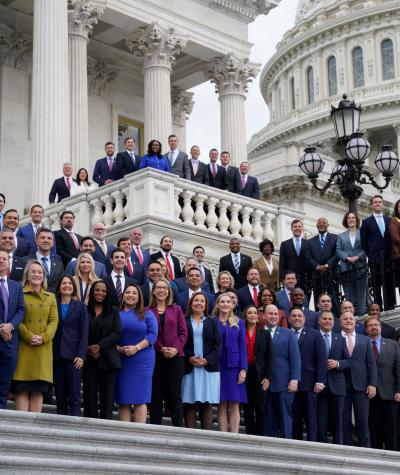Americans looking at their elected officials might struggle to find anyone who genuinely shares their life experiences and day-to-day concerns, as most of our presidents, senators, and members of Congress have been (and continue to be) independently wealthy, and the number of candidates self-funding their campaigns is on the rise.
A Pew Research survey recently showed that 85% of Americans believe “[t]he cost of political campaigns makes it hard for good people to run for office.” And for a variety of reasons, the lack of socioeconomic diversity in government parallels a lack of racial and gender diversity.
While this phenomenon has multiple causes, one major reason we don’t see many low-income candidates is that campaigning is often costly and can require candidates — particularly those in hotly contested races — to forgo other employment, which effectively bars those who can’t afford to give up their salary and benefits from running for office.
Federal Election Commission (FEC) regulations have for years exacerbated the problem by severely limiting candidates’ ability to pay themselves a salary or benefits from their campaign, and as Campaign Legal Center (CLC) has previously noted, the rule has reinforced the de facto bar on individuals who lack personal wealth running for office.
However, the new year brings with it a new rule: Updates to the FEC’s candidate salary rule passed at the end of 2023 represent a big step forward in allowing candidates to draw a reasonable salary from their campaign.
The revised rules now allow candidates to take a salary of either (a) their average annual income over the previous five years that they worked, or (b) 50% of the annual salary paid to a member of Congress, whichever is less.
These revised rules therefore allow someone with limited income, or who may have been unemployed or provided full-time care for a family member during the previous year, to earn a reasonable salary while campaigning for office.
This is a big change from the old rule, which would have barred those candidates from drawing any salary from campaign funds.
Moreover, the new salary rules allow any candidate to start drawing a salary when they file their statement of candidacy, i.e., when they declare that they’re running. That allows candidates to receive a salary during their entire campaign and establishes the same rule for everyone.
This is another significant change from the old rule, which only allowed candidates to start drawing a salary after the filing deadline for their state’s primary ballot. That date differs from state to state and thus, under the old rule, some candidates could not begin to draw a salary until long after they started campaigning.
These changes represent a significant step forward by opening the doors to public office wider for individuals who aren’t independently wealthy. Nevertheless, the new rules are not perfect.
The FEC declined to adopt a number of other measures that many observers — including CLC — urged the Commission to adopt. Under the revised rule, candidates still can’t receive health care benefits from their campaign.
This presents a problem for anyone relying on their job for healthcare; running for office would mean losing that coverage. The revised rule also doesn’t explicitly provide that someone running for office can use campaign funds to cover childcare costs.
The FEC has permitted such uses in particular advisory opinions, but without a clear rule, the question of whether those opinions would apply to other candidates in future circumstances remains up to the FEC’s case-by-case determination.
Overall, while the FEC could have done more, the revised rules should make it easier for candidates who are not independently wealthy to run for office.
Hopefully, that will encourage a more diverse array of candidates — a group that truly represents the socioeconomic, racial, and gender diversity of American voters — to run for office in 2024 and beyond, making democracy a bit more accessible to every American.

